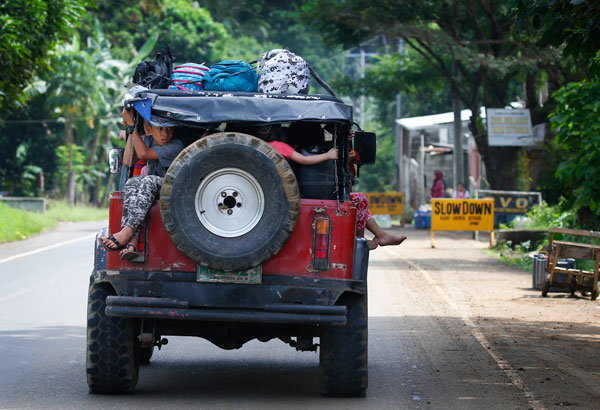Insurgency in Mindanao brought 'purely' by ISIS, Duterte says

Residents fleeing the besieged city of Marawi travel to an evacuation center, Friday, May 26, 2017, in Bal-oi township, southern Philippines. AP/Bullit Marquez, file
MANILA, Philippines (First published on June 1 at 5:42 p.m.) — President Rodrigo Duterte on Thursday said that the crisis engulfing Marawi City was spawned “purely [by] ISIS” or the so-called Islamic State of Iraq and Syria, claiming for the first time that he had already known that terror groups were using drug money to finance their activities even before his announcement on Wednesday.
Duterte, speaking after an oath-taking ceremony for government appointees, said that the Islamist militancy enveloping Marawi City, the only Islamic City in the Philippines, had long been planned by so-called ISIS and its different branches.
“Alam mo yung rebellion sa Mindanao. It’s not Maute. It’s purely ISIS with different branches kasi sila yung nag-umpisa. Actually, iyang Maute brothers went to Libya. Itong Marawi na ito has long been planned. It could not just be a decision, ‘Let’s go to Mindanao.’ Plano na ito lahat. And it’s a long time,” the president said.
Last week, the president said that the Maute brothers were former police officers who got involved with drug money and went to Marawi to put up a large factory for methamphetamine hydrochloride, or shabu.
The president’s claim on Thursday that the siege of Marawi City had been the handiwork of so-called ISIS was in line with the pronouncement of Delfin Lorenzana, the Defense secretary. However, this contradicts what the military had been saying before and during the initial hours of the crisis.
These conflicting statements from the country's government and security officials have led to confusions on the real situation in Mindanao.
"It is actually Maute or ISIS because they are the same," Defense Secretary Delfin Lorenzana said in a press briefing on Tuesday last week.
Philippine security forces however had been insisting that so-called ISIS fighters had not yet established a foothold in the country, at least on the initial stages of the siege.
READ: Duterte bestows ISIS status on Maute group
"'Pag pinapangalanan natin ang local terrorist group, pinapapogi natin sila, pinapasikat natin sila (When we call them ISIS, we are making them famous). We don't have ISIS in the Philippines," Col. Edgard Arevalo, AFP public affairs chief, said last week.
According to a VERA Files report, police and military intelligence reports noted the Maute group's diminishing strength before the clashes began.
Australia FM Bishop relayed ISIS info to Duterte
Australian Foreign Minister Julie Bishop told an Australian broadcaster back then that she had relayed this information to the president during her visit to the country. It is not clear however what steps the government has taken since receiving this information from Canberra.
“So there’s concern that ISIS may well seek to declare a caliphate, an Islamic caliphate in southern Philippines,” she said. “I was in the Philippines recently. I met with President Duterte. We spoke about the reemergence of some of these terrorist networks particularly the southern Philippines.”
Duterte said Thursday that he started to become concerned when Abu Sayyaf sub-leader Isnilon Hapilon was anointed the emir, or the point man, of the Islamist militants and sent to Central Mindanao as he was bringing so-called ISIS fighters with him.
The president insisted, though, that drug money was fueling the Maute group and the Abu Sayyaf as ISIS in the Middle East did not have money.
“[M]aybe nung si Hapilon na pinadala sa Central Mindanao and he was annointed as emir dun na ako nakaamoy something terribly wrong will happen. Kasi dala-dala niya yung ISIS. Yung Maute is just the family name of two brothers,” he said.
He said Wednesday that the government has been able to intercept what little money ISIS in the Middle East allegedly sent.
“They started and I warned you before, I’m warning you now and ISIS, walang pera. I said that by the time they are pushed back and lose the landmass they will scamper to everywhere. Dito ang nagfu-fuel ng insurrection, drugs,” the president added.
The president has, in the past, acknowledged that violence in Mindanao is partly rooted in the struggle for Moro nationalism. He has said in more than one speech that the Moros in Mindanao were merely colonized. He has used instances in the American colonization of the Philippines — like the Battle of Bud Dajo, where around 600 Moros were killed by US forces in 1906 — to rail against the US, which he has announced a separation from.
'Drugs fueling insurrection'
The president also reiterated his statement Wednesday claiming that money from the trade of illegal drugs was fueling insurrection in the Philippines’ troubled south.
He said: “Itong Maute sinadya talaga nila yan. Hindi nakuha ng Pilipino pati itong good boy na media. Hindi ko na lang muna sinabi kasi I was not in the position to reveal it publicly. Ginagamit nila pati Mindanao ang droga nila was really a rice mill mas malaki.”
Duterte placed Mindanao under military rule following clashes between government forces and Islamist militants from the Maute Group and Abu Sayyaf. So far, 120 terrorists and scores of security forces have been killed in the firefight as the military is struggling to drive the remaining fighters out of their hideouts and the city.
The fighting however has been taking its toll on the once bustling city of 200,000 as most of its population have fled to neighboring towns and cities for shelter. The clashes have also decimated many structures in Marawi and forced the closure of business establishments.
- Latest
- Trending




























